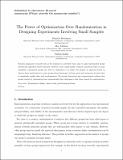The Power of Optimization Over Randomization in Designing Experiments Involving Small Samples
Author(s)
Johnson, Mac; Kallus, Nathan; Bertsimas, Dimitris J
DownloadThePowerOfOptimization.pdf (653.9Kb)
OPEN_ACCESS_POLICY
Open Access Policy
Creative Commons Attribution-Noncommercial-Share Alike
Terms of use
Metadata
Show full item recordAbstract
Random assignment, typically seen as the standard in controlled trials, aims to make experimental groups statistically equivalent before treatment. However, with a small sample, which is a practical reality in many disciplines, randomized groups are often too dissimilar to be useful. We propose an approach based on discrete linear optimization to create groups whose discrepancy in their means and variances is several orders of magnitude smaller than with randomization. We provide theoretical and computational evidence that groups created by optimization have exponentially lower discrepancy than those created by randomization and that this allows for more powerful statistical inference.
Date issued
2015-04Department
Massachusetts Institute of Technology. Operations Research Center; Sloan School of ManagementJournal
Operations Research
Publisher
Institute for Operations Research and the Management Sciences (INFORMS)
Citation
Bertsimas, Dimitris, Mac Johnson, and Nathan Kallus. “The Power of Optimization Over Randomization in Designing Experiments Involving Small Samples.” Operations Research 63, no. 4 (August 2015): 868–876.
Version: Author's final manuscript
ISSN
0030-364X
1526-5463